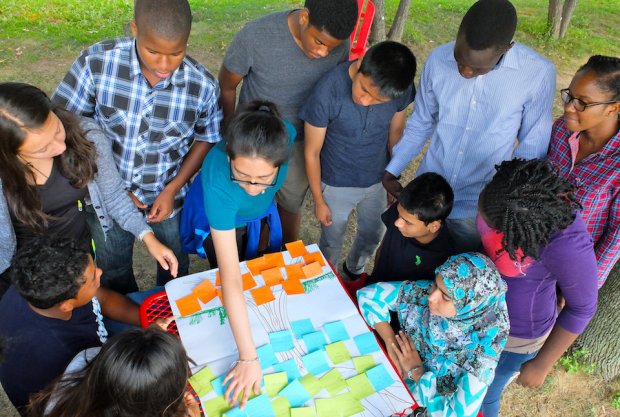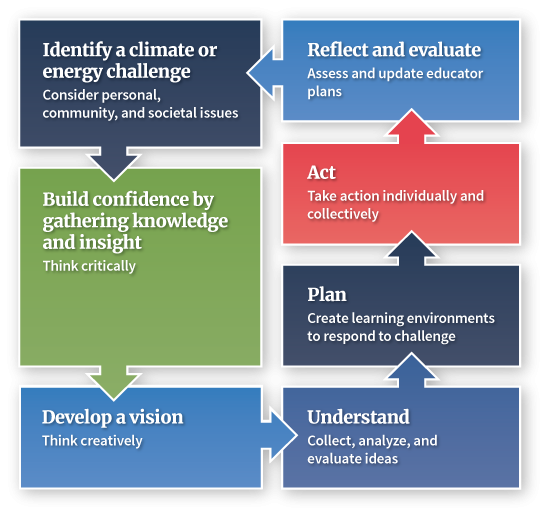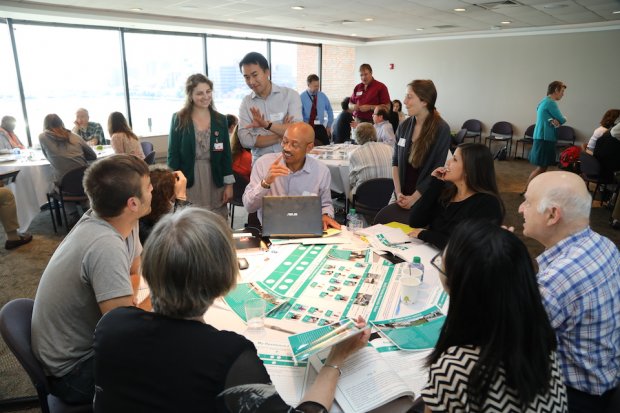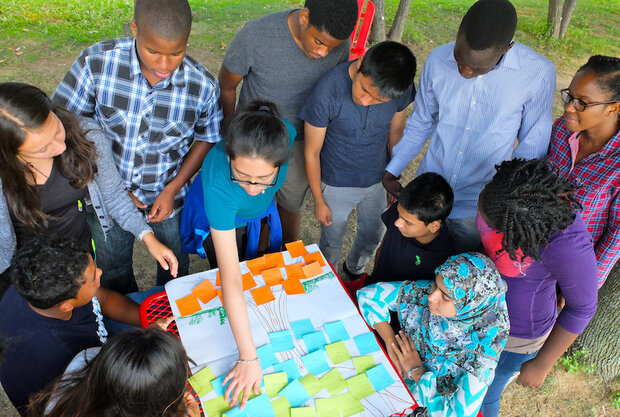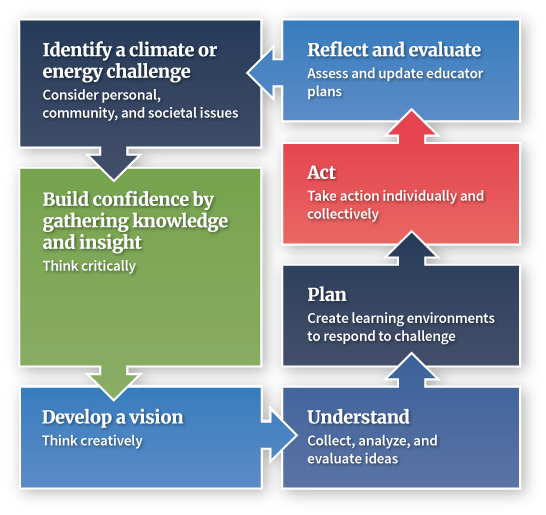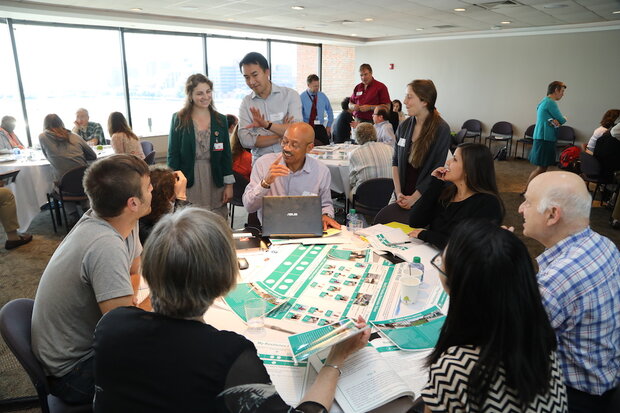Figure 1: Alliance for Climate Education leader working with a group of students....
Teachers across the country are preparing to teach the science and engineering called for in the new standards designed to address major world challenges and opportunities. Students will face issues, such as generating sufficient clean energy, building climate resilience for businesses and communities, maintaining supplies of food and clean water, and solving the problems of global environmental change that confront society today and in their future. The amount of time teachers are spending on these issues are going up significantly.
NOAA Climate.gov and a community of educational and science partners have developed and organized supporting resources and programs for those who want to teach climate and energy science, backed by some of the nation's most experienced professional educators, scientists, and engineers. The Climate Action Learning Process (CALP, below) provides a path teachers can follow to educate students about climate and energy science, develop the skills to take action, and then reevaluate teaching methods. A supporting toolbox (right) organizes and highlights resources from numerous teaching professionals and science partners all working toward supporting climate and energy education.
These science-based, interdisciplinary models of education and public engagement support learners of all levels and foster climate and energy literacy and action. Armed with newfound knowledge and skills, students will be able to develop their own action plans - in their own communities or on a global scale.
Climate Action Learning Process
Highlighted resources from numerous educational and science partners and programs that support the Climate Action Competence Learning Process. The resources in the toolbox are not comprehensive and will grow as new aligned and effective resources are identified. New resources can be nominated by sending them to climate-education@noaa.gov.
Step 1: Identify a Climate or Energy Topic or Issue
- NRC Framework for K-12 Science Education - Science, engineering, and technology permeate nearly every facet of modern life and hold the key to solving many of humanity's most pressing current and future challenges. The United States' position in the global economy is declining, in part because U.S. workers lack fundamental knowledge in these fields. To address the critical issues of U.S. competitiveness and to better prepare the workforce, A Framework for K-12 Science Education proposes a new approach to K-12 science education that will capture students' interest and provide them with the necessary foundational knowledge in the field. https://www.nap.edu/catalog/13165/a-framework-for-k-12-science-education-practices-crosscutting-concepts
- NGSS and CLEAN at a Glance for the Next Generation Science Standards tool - The interactive tables will NGSS Performance Expectations (PE) and Disciplinary Core Ideas (DCI) that address climate and energy topics. The tables include links to relevant CLEAN resources. https://cleanet.org/clean/educational_resources/clean-ngss/glance.html
- College, Career, and Civic Life (C3) Framework for Social Studies State Standards - The result of a three year state-led collaborative effort, the College, Career, and Civic Life (C3) Framework for Social Studies State Standards was developed to serve two audiences: for states to upgrade their state social studies standards and for practitioners — local school districts, schools, teachers and curriculum writers — to strengthen their social studies programs. Its objectives are to: a) enhance the rigor of the social studies disciplines; b) build critical thinking, problem solving, and participatory skills to become engaged citizens; and c) align academic programs to the Common Core State Standards for English Language Arts and Literacy in History/Social Studies. https://www.socialstudies.org/c3
- Climate Literacy: The Essential Principles of Climate Science (2009) - A guide that provides a framework and essential principles for formal and informal education about climate change. It presents important information for individuals and communities to understand Earth's climate, impacts of climate change, and approaches for adapting and mitigating change. Principles in the guide can serve as discussion starters or launching points for scientific inquiry. The guide can also serve educators who teach climate science as part of their science curricula. https://www.climate.gov/teaching/essential-principles-climate-literacy/essential-principles-climate-literacy
- Energy Literacy: Essential Principles and Fundamental Concepts for Energy Education - An interdisciplinary approach to teaching and learning about energy. The framework identifies seven Essential Principles and a set of Fundamental Concepts to support each principle. The guide does not seek to identify all areas of energy understanding, but rather to focus on those that are essential for all citizens K-Gray. It presents energy concepts that, if understood and applied, will help individuals and communities make informed energy decisions. https://energy.gov/eere/education/energy-literacy-essential-principles-and-fundamental-concepts-energy-education
- Ocean Literacy Framework - Ocean Literacy means understanding the ocean’s influence on you and your influence on the ocean. There are 7 principles of Ocean Literacy — ideas scientists and educators agree everyone should understand about the ocean. Join the Network to build a more ocean literate society! http://oceanliteracy.wp2.coexploration.org/
- NAAEE Guidelines for Excellence: Best Practice in Environmental Education - The NAAEE National Project for Excellence in Environmental Education developed a series of guidelines that set the standards for high-quality environmental education. Each of these publications was developed by a diverse team of professionals, and each has gone through a substantive review by thousands of professionals prior to its publication. The Excellence in Environmental Education: Guidelines for Learning (K-12) and its companion piece, the Excellence in Environmental Education: Guidelines for Learning (K–12)—Executive Summary & Self Assessment Tool, were developed to support state and local environmental education efforts by setting expectations for performance and achievement in grades 4, 8, and 12. https://naaee.org/eepro/publication/excellence-environmental-education-guidelines-learning-k-12
Step 2: Build Confidence in Development of Knowledge and Insight (Critical Thinking)
(Critical Thinking for the subject matter, by pedagogy, with advances in science, and how society is successfully responding
Pedagogy
- Teacher-Friendly Guide to Climate Change - The Teacher-Friendly Guide™ to Climate Change is the newest addition to the Paleontological Research Institution’s Teacher-Friendly series. This book includes both the basics of climate change science and perspectives on teaching a subject that has become socially and politically polarized. The focus audience is high school Earth science and environmental science teachers, and it is written with an eye toward the kind of information and graphics that a secondary school teacher might need in the classroom. Print copies and a free PDF version are available here.
- CLEAN Guidance in Teaching Climate and Energy - These pages designed to help educators understand and be equipped to teach the big ideas in climate and energy science. https://cleanet.org/clean/literacy/index.html
- NWF’s Eco-Schools USA - Eco-Schools combines the effective green management of K – 12th grade school grounds, facilities, and curriculum to empower today’s students for a sustainable tomorrow. It is part of Eco-Schools, the world’s largest environmental schools network in over 64 countries. In addition to the direct environmental benefits of lowering the school’s carbon footprint and saving energy and water costs, the program provides a proven framework for improving student skills in STEM, promoting youth leadership and community service, and exposing students to careers in sustainability. The program provides 12 intersecting pathways for comprehensive learning and student action, such as energy and climate change. http://www.eco-schoolsusa.org/
- PBS Learning Media Forum on Digital Media for STEM Learning: Climate Education - This Forum on Digital Media explored how the stories and science behind these impacts are increasingly being integrated into classroom instruction and STEM education contexts, with a focus on digital media. Held at WGBH’s Brighton studio on Monday, November 9, 2015, this highly-interactive and fast-paced event examined emerging narratives in climate education, digital media tools and products that show unique potential for educational settings, and promising modes of engagement for students, teachers, and schools. All resources are available free to view in PBS Learning Media. https://mass.pbslearningmedia.org/collection/forum-on-digital-media-for-stem-learning-climate-education/#.WphmgRMbM6h
Advances in science
- USGCRP National Climate Assessment (2018) - The National Climate Assessment (NCA) assesses the science of climate change and variability and its impacts across the United States, now and throughout this century. This assessment was written to help inform decision-makers, utility and natural resource managers, public health officials, emergency planners, and other stakeholders by providing a thorough examination of the effects of climate change on the United States. It was thoroughly reviewed by external experts and the general public, as well as the Federal Government (that is, the NCA4 Federal Steering Committee and several rounds of technical and policy review by the 13 federal agencies of the USGCRP). An expert external peer review of the whole report was performed by an ad hoc committee of the National Academies of Sciences, Engineering, and Medicine (NASEM). https://nca2018.globalchange.gov/
- USGCRP Climate Science Special Report (2017) - The Climate Science Special Report (CSSR) is designed to be an authoritative assessment of the science of climate change, with a focus on the United States, to serve as the foundation for efforts to assess climate-related risks and inform decision-making about responses. In accordance with this purpose, it does not include an assessment of literature on climate change mitigation, adaptation, economic valuation, or societal responses, nor does it include policy recommendations. https://science2017.globalchange.gov/
- USGCRP Indicators - Indicators are observations or calculations that can be used to track conditions and trends. For example, businesses might look at the unemployment index as one of a number of indicators representing the condition of the economy. Similarly, indicators of climate change can communicate key aspects of the changing environment, point out vulnerabilities, and inform decisions about policy, planning, and resource management. https://www.globalchange.gov/explore/indicators
- NOAA Climate.gov News & Features - A popular-style magazine for the science-interested public covering topics in climate science, adaptation, and mitigation. https://www.climate.gov/news-features
- NOAA Climate.gov Maps & Data - A gateway to reusable climate maps and datasets that document various climate conditions. The section aims to serve officials and professionals who need climate data to inform their decisions or compile a climate adaptation report. https://www.climate.gov/maps-data
- NASA Global Climate Change: Vital Signs of the Planet - The mission of “Global Climate Change: Vital Signs of the Planet” is to provide the public with accurate and timely news and information about Earth’s changing climate, along with current data and visualizations, presented from the unique perspective of NASA, one of the world’s leading climate research agencies. https://climate.nasa.gov/
How society is successfully responding
- U.S. Climate Resilience Toolkit - The U.S. Climate Resilience Toolkit is a website designed to help people find and use tools, information, and subject matter expertise to build climate resilience. The Toolkit offers information from all across the U.S. federal government in one easy-to-use location. https://toolkit.climate.gov/
- C40 - A network of the world’s megacities committed to addressing climate change. C40 supports cities to collaborate effectively, share knowledge and drive meaningful, measurable and sustainable action on climate change. http://www.c40.org/
- 100 Resilient Cities - Pioneered by the Rockefeller Foundation (100RC) is dedicated to helping cities around the world become more resilient to the physical, social and economic challenges that are a growing part of the 21st century. http://100resilientcities.org/
- Georgetown Climate Center - The nonpartisan Georgetown Climate Center seeks to advance effective climate and energy policies in the United States and serves as a resource to state and local communities that are working to cut carbon pollution and prepare for climate change. http://www.georgetownclimate.org/
Step 3: Develop a Vision (Creative Thinking)
Develop competence and mastery in teaching climate change
-
Climate Generation Professional Development - Climate Generation believes that educators are critical messengers of climate and that energy literacy and climate change education is part of the solution. Build your comfort, confidence, and competence to bring climate change into your educational setting with our virtual and in-person training opportunities! https://www.climategen.org/what-we-do/education/professional-development/
-
Summer Institutes for Climate Change Education - At each Institute educators can expect to gain the tools and skills to bring climate change into your educational setting, whether it be a classroom, nature center, or museum.
-
-
AMS Education Professional Development - Enhance your knowledge of Earth system science and earn tuition-free graduate credit through AMS Education’s K-12 teacher professional development programs. Over 21,000 teachers have boosted their STEM expertise and impacted millions of students across the nation through these courses. https://www.ametsoc.org/ams/index.cfm/education-careers/education-program/k-12-teachers/
-
Project Atmosphere - Project ATMOSPHERE is the comprehensive teacher professional development program based on studies in the atmospheric sciences.
-
DataStreme Earth's Climate System - This STEM course undertakes a systematic study of climate, climate variability, and climate change. Participants will come to understand spatial variations in climate as it responds to mechanisms internal and external to the Earth system.
-
DataStreme Ocean - This STEM course explores the ocean in the Earth system. Participants study the flow of water and energy into and out of the ocean and the internal properties and dynamics of the ocean system. This includes interactions between the ocean and the hydrosphere, atmosphere, lithosphere, biosphere and society.
-
DataStreme Atmosphere - Designed to train teachers to promote the teaching of STEM concepts through weather, this course focuses on the atmospheric environment, its interaction with other components of the Earth system and the implications of those interactions on humankind.
-
Maury Project - The Maury Project is a comprehensive teacher professional development program based on studies of the physical foundations of oceanography.
-
- NSTA Learning Center - NSTA Learning Center as your online platform when developing professional learning experiences for teachers of science. https://learningcenter.nsta.org/
- CLEAN Teleconference and webinars - Tuesdays at 1pm Eastern time CLEAN Network members meet in a teleconference to collaborate and share information about their literacy work, upcoming events, opportunities for collaboration or funding. Frequently guest speakers present on the topic of climate and energy literacy.
- GLOBE Program - The Global Learning and Observations to Benefit the Environment (GLOBE) Program is an international science and education program that provides students and the public worldwide with the opportunity to participate in data collection and the scientific process, and contribute meaningfully to our understanding of the Earth system and global environment. https://www.globe.gov/
- Climate.gov Teaching Climate Professional Development - Teaching Climate offers learning activities and curriculum materials, multimedia resources, and professional development opportunities for formal and informal educators who want to incorporate climate science into their work. https://www.climate.gov/teaching/professional-development
- NOAA Planet Stewards Education Project - The NOAA Planet Stewards Education Project (PSEP) provides formal and informal educators working with elementary through college aged students the knowledge and resources to build scientifically-literate individuals and communities who are prepared to respond to environmental challenges monitored by NOAA. PSEP also supports educators in the development and implementation of projects involving hands-on activities that conserve, restore, and protect human communities and natural resources.
- Webinars
- The Book Club
- Face-to-Face Workshops
- Stewardship Community (apply here)
Step 4: Understanding (Gathering, analyzing, and evaluating ideas)
Work across disciplines or Design active linkages to create relevant interdisciplinary curriculum experiences (Develop Educator Teaching Plan)
-
Understanding Global Change and Understanding Science - The Understanding Global Change web resource in development from the UC Museum of Paleontology at UC Berkeley will provide science educators with a conceptual framework, systems models, lessons, and assessment tools to guide the design of interdisciplinary global change curricula. Understanding Science provides resources to support the exploration of the nature and process of science. http://www.ucmp.berkeley.edu/ugc-resources/ and https://undsci.berkeley.edu/
-
World Climate: Climate Change Negotiations Game - The World Climate Simulation is a role playing exercise of the UN climate change negotiations for groups. It is unique in that it uses an interactive computer model to rapidly analyze the results of the mock-negotiations during the event. All the materials and tools for World Climate are available for free and many are available in multiple languages. We encourage you to organize a World Climate Simulation yourself. https://www.climateinteractive.org/programs/world-climate/
- Project Drawdown - The project is one of the most comprehensive plan ever proposed to reverse global warming. Their organization did not make or devise the plan—they found the plan because it already exists. They gathered a qualified and diverse group of researchers from around the world to identify, research, and model the 100 most substantive, existing solutions to address climate change. What was uncovered is a path forward that can roll back global warming within thirty years. It shows that humanity has the means at hand. Nothing new needs to be invented. The solutions are in place and in action. Their work is to accelerate the knowledge and growth of what is possible. http://www.drawdown.org/
Step 5: Planning (Create learning environments for responding to climate changes)
Connect to resources and professional networks to sustain professional growth and as a support network
Educational Resources
- CLEAN Collection of Climate and Energy Science resources - The CLEAN collection, is an online database of 700 free, science and peer-reviewed, and ready-to-use educational resources for teaching middle, high school and undergraduate students about climate and energy.
- Teaching Climate Using the National Climate Assessment - NOAA's Climate.gov features a page of information about teaching with the Third National Climate Assessment, including background on the report, learning pathways to help educators utilize key messages and data, region-by-region guides, and other supporting education and communication resources. https://www.climate.gov/teaching/national-climate-assessment-resources-educators/2014-national-climate-assessment-resources
- Climate Generation Climate Change and Energy Curricula - Climate Generation offers a suite of Grades 3-12 curriculum resources in the form of curriculum guides, as well as online modules that can be downloaded for free. https://www.climategen.org/what-we-do/education/climate-change-and-energy-curricula/
- Alliance of Climate Education, Our Climate Our Future - Our Climate Our Future is an award-winning climate education resource for teachers and students featuring ACE’s signature mix of animation, video and interaction, including trivia questions, climate change lesson plans and more. ourclimateourfuture.org
- National Wildlife Federation’s (NWF) Climate Classroom is online climate science and solutions curriculum, learning community and education policy development program to help K-16 educators develop skills in and have the tools and public support they need to teach students about the most important environmental subject they will experience throughout their lifetimes. NWF provides teacher training and developed the following websites with media partners to help everyone, especially youth, meet the challenge of a new climate reality and ensure that all people can take an active role in shaping a more sustainable and climate resilient future.
-
Climate Classroom Kids - For younger students climate change can seem complicated and scary. That’s why age appropriateness is a vitally important ingredient of climate change education. How do you answer the questions children will inevitably raise about climate change? And how do you examine the topic in a manner that doesn’t frighten or overwhelm them? The best strategy is to provide young children with brief, accurate information at a level you know they can understand and relate to—and in hopeful ways. Climate 101 provides answers to real kids questions. The cross-curricular lesson plans are designed for grades 3-5, with extensions for younger and older students. https://climateclassroomkids.or
-
Climate Classroom for Years of Living Dangerously - Climate Smart lessons plans and resources correspond to the science and issues presented in the award-winning documentary series and offer a unique and timely interdisciplinary teaching opportunity. Their education initiative provides engaging and relevant video assets as part of the curriculum. Educators and students meet scientists, acquire knowledge and STEM skills necessary to meet academic challenges and graduate climate literate. https://climateclassroom.org
-
An Inconvenient Sequel Education - Their goal is to help students develop system thinking skills by leveraging the diverse perspectives and fact-based evidence shared in the film. Resources include a series of foundational climate science and civics lessons, case studies and action projects planning guide. https://www.inconvenientsequeleducation.org
-
- EarthLabs - the EarthLabs project provides a national model for rigorous, engaging Earth and environmental lab science courses. These units illustrate a sequence for learning science concepts through data analysis activities, satellite imagery and computer visualizations, and hands-on experiments that illustrate processes of our Earth system. https://serc.carleton.edu/eslabs/index.html
- WindWise Education - WindWise is broken into 5 main conceptual areas. Each unit includes a variety of lesson plans, handouts, support and background materials. While the lessons are not designed to be done in any particular order we do offer you some recommend pathways depending on your subject expertise and the time you want to spend teaching about wind energy. https://www.kidwind.org/windwise-1
- Young Voices for the Planet film series - The mission of the Young Voices for the Planet film series is to to limit the magnitude of climate change and its impacts by empowering children and youth, through uplifting and inspiring success stories, to take an essential role in informing their communities — and society at large, challenging decision-makers, and catalyzing change. https://www.youngvoicesfortheplanet.com/
Professional networks
- CLEAN Network - The CLEAN Network is a professionally diverse community of over 630 members committed to improving climate and energy literacy locally, regionally, nationally, and globally, to enable responsible decisions and actions. https://cleanet.org/clean/community/index.html
- NOAA Planet Stewards Education Project - The NOAA Planet Stewards Education Project (PSEP) provides formal and informal educators working with elementary through college aged students the knowledge and resources to build scientifically-literate individuals and communities who are prepared to respond to environmental challenges monitored by NOAA. PSEP also supports educators in the development and implementation of projects involving hands-on activities that conserve, restore, and protect human communities and natural resources. https://oceanservice.noaa.gov/education/planet-stewards/
- Climate Generation’s #TeachClimate Network - The #TeachClimate Network brings educators together monthly to discuss climate change fiction (cli-fi) books, challenges and successes of implementing climate change education, and current climate change news. https://www.climategen.org/what-we-do/education/professional-development/teachclimate-network/
- NWF EcoLeaders - The NWF Campus Ecology program has been working with colleges and universities for more than 25 years to protect wildlife and habitat through campus sustainability efforts. Recognizing that students are the catalysts for change, NWF Campus Ecology created NWF EcoLeaders - a leadership certification and career development program for college students and young professionals. http://www.nwfecoleaders.org/home
- Greenforce® Initiative - The National Wildlife Federation and Jobs for the Future are partners in the Greenforce® Initiative, an effort to strengthen the capacity of community colleges to "green" the skills of our modern workforce. https://www.nwf.org/Greenforce-Initiative
- NSTA Learning Center Forums - NSTA’s Learning Center allows educators to access excellent and engaging science content and pedagogical implications any time of the day or night – 24/7 – to fit their schedule. https://learningcenter.nsta.org/discuss/
- NSTA Group E-mail Discussions - NSTA’s lists are group e-mail discussions that allow members to exchange information in a peer-to-peer forum. http://www.nsta.org/membership/listserver.aspx
- NAAEE eePRO Climate Change Education Group - The NAAEE eePRO group discussion platform supports special interest groups and connecting people to discuss key issues related to all things environmental education (EE) including climate change education. https://naaee.org/eepro/groups/climate-change-education
- National Earth Science Teachers Association (NESTA) - NESTA facilitates and advances excellence in K-12 Earth and Space Science education, serving a diverse population of learners in formal and informal settings. https://serc.carleton.edu/nesta/index.html
- National Association of Geoscience Teachers - NAGT members are committed to teaching excellence and the preparation of productive, responsible citizens who understand the complexity and vulnerability of the planet that sustains all of us. https://nagt.org/nagt/about/index.html
- ACE Teacher Network - ACE’s Teacher Network is an active group of over 10,000 educators in all 50 states. As a member, you'll receive our monthly newsletter, Hot Planet, Cool Teachers, bringing you the latest in climate news, climate and energy lesson plans, teacher professional development and updates from ACE. https://acespace.org/join/teachers
- NCSEteach - NCSEteach is the National Center for Science Education’s first program developed just for educators. They recognize that teachers are at the forefront of science education. Without them we would have no doctors, no researchers, and no citizens with a love and devotion to the scientific enterprise. They also recognize that there can be numerous challenges to teaching evolution and climate change that teachers must navigate, from angry and confused students, teachers, and administrators to a lack of available professional development. Teachers have a hard job, and NCSE wants to help any way we can. https://ncse.com/teach
- National Network for Ocean and Climate Change Interpretation (NNOCCI) - NNOCCI is a network of individuals and organizations in informal education, the social sciences, and climate sciences. We are currently working in 170 institutions in 38 states. We share a commitment to using evidenced-based communications methods and providing the social and emotional support needed to engage as climate communicators. By working together we develop the knowledge, techniques, community and confidence needed to empower our audiences. And by speaking about climate change consistently across the country we are changing public discourse to be positive, productive and solutions-focused. https://climateinterpreter.org/about/projects/NNOCCI
Step 6: Acting (Individually & Collectively)
Nurture action competence
- Climate Generation Climate Convenings Toolkit - When it comes to implementing climate change solutions, local communities are powerfully positioned to create an undercurrent of momentum and ambitious pathways to change that our national and global leaders cannot easily ignore. Yet in many communities, there are significant gaps in climate literacy, political will, and awareness of tangible climate action opportunities. To bridge this gap, Climate Generation has developed a best practices guide that shares our model and method for hosting public convenings on climate change at the community level. https://www.climategen.org/what-we-do/education/public-engagement/climate-convenings-toolkit/
- KidWind Challenge - While this is called a KidWind Challenge, they tend to think of it more like a celebration of wind power. The overall goal is to have fun building a device that converts moving wind into electricity. If along the way you learn some physics, engineering, environmental science and policy -- that is great! https://www.kidwindchallenge.org/
- ReCharge Labs - REcharge Labs generates resources for learners to creatively explore wind and solar power. We engage and inspire today’s K-12 students, educators, makers, and tinkerers to become the innovative renewable energy leaders of tomorrow by offering effective hands-on activities and kits, educator professional development, online engineering design challenges, and lessons. http://www.rechargelabs.org/
- Alliance of Climate Education (ACE) Action Fellowship - The North Carolina Action Fellowship teaches students the knowledge and skills to be confident climate leaders. Fellows are high school students or recent ACE graduates who meet in Raleigh weekly over the course of the school year. 40 high school students have graduated from the fellowship in NC over the past 3 years. https://acespace.org/fellowship
-
An Inconvenient Sequel Education - Our goal is to help students develop system thinking skills by leveraging the diverse perspectives and fact-based evidence shared in the film. https://www.inconvenientsequeleducation.org
-
Enter the School Climate Solutions Challenge - We are asking teachers and students from grades 6 to 12 to plan and submit their best climate solution ideas for their school, after-school program, team or club. We are looking for innovative project ideas that will reduce carbon emissions and help your school and your community prepare for problems caused by climate change, interact with decision-makers, and take full advantage of the career opportunities the climate resilient future holds. https://www.inconvenientsequeleducation.org/climate-solutions-challenge/
-
-
The Wild Center’s Youth Climate Summit model - Looking to host a summit of your own? No matter where you’re located in the world, the Wild Center’s Youth Climate Summit model is a replicable, scalable model that any organization can base their own summit off of. To get you started, they’ve compiled a helpful Youth Climate Summit toolkit and appendix for you to download and start planning your own climate summit. https://www.wildcenter.org/our-work/youth-climate-summit/youth-climate-summit-toolkit/
Step 7: Reflecting and Evaluating (Assess and update Educator Plans)
Assess, Revise and Share Effective Practice
Building the capacity of students and teachers have been shown to have the greatest cost-benefit value for adaptation to climate change (Lutz et al. 2014). But while education can be one of the most efficient mechanism for changing individuals and communities climate related actions and improving climate literacy, it is still emerging how to best deliver it (Mochizuki and Bryan 2015).
While many education programs around the world have done an excellent job building students’ knowledge around the causes of climate change, limited evidence exists that this knowledge is sufficient to change the actions responsible for climate change (Eilam and Trop 2012). Ironically, it is often the most educated that lead the most carbon intensive lifestyles, suggesting it is not more education that is needed, but different education. As this different and more effective educational practice is developed, educators and program developers can connect with others to share what works. The diverse professional networks above in step 5 are places where this new form of education is already being developed.
Figure 3: ASU/MOS
Building Sustainable Communities
Communities are stepping up to address climate change impacts, serving as the primary incubators of social innovation and generating new strategies for sustainable living. Teachers can build knowledge of climate science and energy infrastructure, and encourage individuals to gain the skills, attitudes, and motivations they need to build sustainable communities. Tomorrow’s workforce must be able and willing to solve urgent challenges, such as climate change.
Building A Community Committed To Improving Climate And Energy Know-How
The CLEAN Network is a professionally diverse community of over 640 members committed to improving climate and energy literacy locally, regionally, nationally, and globally, to enable responsible decisions and actions. The two main methods of engagement in the CLEAN Network are a email list and participation in the weekly teleconference highlighting important programs and initiatives. Other activities of the CLEAN Network include providing feedback on relevant national-scale documents, engagement through professional meetings, and outreach through postings on the CLEAN Facebook page and informational webinars. Join the CLEAN Network
